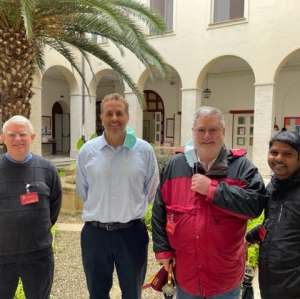Peter MALONE
Starling, The
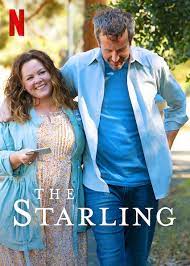
THE STARLING
US, 2021, 102 minutes, Colour.
Melissa McCarthy, Chris O'Dowd, Kevin Kline, Timothy Olyphant, Daveed Diggs, Skyler Gisondo, Laura Harrier, Rosalind Chao, Kimberly Quinn, Loretta Devine, Ravi Kapoor.
Directed by Theodore Melfi.
We know that Melissa McCarthy is a successful hand at kinds of comedy. She has nothing to prove. However, with St Vincent and with Can You Ever Forgive Me?, She proved that she can do serious roles as well. This is basically a serious role with some comic touches. She is matched by Chris O’Dowd, also an effective screen presence both comic and serious.
There is an added pleasure in seeing Kevin Kline as the therapist who has retired and become a vet. There are quite a number of character actors in small supporting roles. The director, Theodore Melfi (St Vincent) coproducers with his wife, Kimberly Quinn, who plays Regina working at the institution.
And the starling? This is a bird whom we initially see preparing its nest with sweet wrappers and a baby is booty, a rather territorial bird who perches on the branch and dived bomb frequently at Melissa McCarthy’s Lily, working in her garden – a kind of war is declared, Lily wearing a helmet but nevertheless being attacked, buying the statue of an owl as a kind of scare-starling, getting some poison but killing the wrong bird, eventually chucking a rock at the starling and having to take it to the vet. The starling is in agent provocateur, perhaps a symbol of the complicated emotional conflicts emotional conflicts in Lily’s life.
Actually, the film is about the loss of a child, grief, depression, suicidal feelings, mental illness, therapy… Many audiences will be able to identify with the mother and father who have lost their child, the father blaming himself, in an institution, resisting therapy, finding a difficulty to relate to his wife, not recognising her bewilderment but her determination to cope, no matter what.
There are many scenes at the institution, couples therapy (their being seated at school desks rather than in a circle), visited family day, pottery therapy, weaving therapy. In the meantime, only works at the local supermarket, is distracted, finds some kind of relaxation in working in the garden, despite the starling, and has to drive an hour their impact to visit her husband who sometimes finds her but does not speak.
And there is interesting complexity also when the nurse at the institution suggests that Lilly get in touch with Dr Fine, now a vet (skilful but not always patient with the pet owners!). And it is a pleasure to see Kevin Kline, his enabling Lily to open out to him, offering some wise advice, visiting her husband. And, tending the starling after it is hit by the stone. And, spoiler, yes it does feel and flies off.
The film ends on an upbeat note, a farcical moment (and, yes, with the starling again).
- The title? The bird? Making the nest, protecting the young, on the bridge, territorial, attacking Lilly, agent provocateur? Symbol?
- The setting, the town, the pleasant home, grounds, gardening? The supermarket? The countryside and the travel to the institution? Interiors, grounds? Plant shops? Authentic atmosphere?
- The musical score, the range of songs, inserted throughout the drama, the lyrics and the relevance to the characters experiences?
- The prologue, Lilly and Jack painting the wall, talking about their daughter? The mystery of her death? Jack’s latest story, his sleeping in, blaming himself?
- A film about grief, loss, depression, mental issues, suicide attempts, institutions, group therapy, individual therapy?
- Melissa McCarthy as Lilly, a serious role, some comic touches? Age, experience, married to Jack, the scenes of happiness together, in the car, painting the room? Her shock at finding him missing from the bed, to the garage, opening the garage, his survival? Going to the institution? Her resilience, self-determination, not knowing the stages of grief, her erratic behaviour and distraction at the supermarket, comments from her boss, the young assistant, mistaking the prices and the run on goods, driving the hour and back to see Jack, the group therapy sessions, Regina and her interventions? The couple going for walks? Jack ringing Lilly but not speaking?
- Lilly, trying to cope, selling the cot, all the furniture, the young couple and the exchange for the lounge chair? Simplicity in the house, the lounge, watching television, the religious exhortation programs? Working on the grounds, clearing, planting? The attack of the starling, the injuries? Going to the shop, buying the owl to scare the starling, the droppings on the owl? Wearing the helmet? Climbing the ladder, seeing the chicks, the starling attacking and her falling off the ladder?
- Regina giving Lilly Dr Fine’s address? Discovering that he was a vet? The filling in his background, Johns Hopkins, backing out, uncertainties, thought of as a loser? His work as a vet, animals, customers, treatment? His assistant and her help? Lilly’s arrival, bewilderment, the beginning of the conversation?
- Dr Fine, age, experience, therapy, giving it up, the vet? His dealing with pets, with the customers, with the young man distraught and his cat? Talking with Lilly, her visits, his suggestions, the stages of grief? Her walking in the rain, his wanting appointments? Her bringing the bird, the treatment, helping the bird? The taking at home, tending it, Dickie from the supermarket, his help and attention, attack by the bird, Lilly helping it, the drops, the wings bound? Its coming alive, Lilly’s joy, taking it out, the binding from the baby booty, letting it fly?
- Jack and his story, teacher, suffering from depression, not taking his medication, the discussions with his doctor, taking notes, his scepticism? At the group discussions? Lilly and her visits, their talking, her attack on him, his being upset, refusing her visits, the visit from Dr Fine and their discussions, the effect, his change of heart, the phone call to Lilly and her talking? Going to the session, being honest, telling his story? The effect?
- The staff at the centre, the doctor, Regina, her interventions with Lilly? Ben, his supervision of the craft sessions, pottery, weaving? The family day, Jack and his playing with the children, the animals, frightening the children, pushing Ben over? The men being the animals? Velma and her angry outburst at the group session? Working alongside Jack, friendly?
- The reconciliation, walking and talking, Lilly and her stories, acknowledging the reality, grief? Jack and his honesty? Their going home, working in the garden, helmets, the jokey ending with the two birds attacking? (But what about the chicks in the nest – no narrative follow-up!)
Alpinist, The
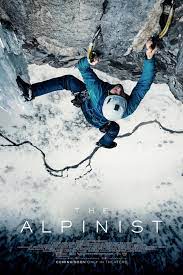
THE ALPINIST
US, 2021, 93 minutes, Colour.
Directed by Peter Mortimer, Nick Rosen.
Three years ago there was a test for audience endurance as they accompanied mountain climber, Alex Honnold, in the award-winning film, Free Solo, on his - for him ordinary but for us, edge-of seat – mountain climbing endeavouras.
He is one of the talking heads in this same-vein documentary, praising a younger and even more adventurous and enterprising climber from British Columbia, Mark-Andre Leclerc.
Climbers will find this film a must. The scenery is mountains, magnificent, from British Columbia itself to the Rockies, to Patagonia. (And, ironically with the official title given to the climbers, Alpinists, no climbing in the actual Alps!). Not only the scenery, but the up-close as well as sweeping photography is spectacular. The film is a tribute to the two directors, Peter Mortimer and Nick Rosen who followed Mark Andre Leclerc and his climbing for two years. There are a lot of close-ups, even extreme close-ups, making the audience feel that we were there.
Mark Andre was the basic climber, minimal equipment, spiked shoes, ice axes, haversack, when necessary, with tent and food. There is a great deal of his climbing, illustrating his techniques, finding crevices, testing rock strength, checking ice solidity, alertness for avalanches, possibilities of danger.
When he is introduced, his 23 years of age, and already an achiever, with an emerging reputation amongst the climbers many of whom appear throughout the film, quite some testimonies.
He could have ruined his prospects with partying in his early adult years, drugs, alcohol, but getting hold of himself. He is also found a girlfriend, Brette Harrington, not just support but also a skilled climber herself, sharing so much with him.
By the end, with a lot of video footage, we feel that we have come to know Marc-Andre, have climbed the mountains, especially in Patagonia where he did not succeed the first time out he went tried again, succeeded (and some happily joyful scenes with the locals).
Which means that at the end of the film, we have come to know Marc-Andre. The ending is unexpected – we join in tributes to Marc-Andre.
Fair Haven
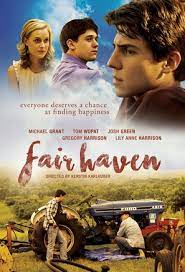
FAIR HAVEN
US, 2016, 90 minutes, Colour.
Michael Grant, Tom Wopat, Gregory Harrison, Josh Green, Lily Ann Harrison, Tom Malloy.
Directed by Kirsten Karlhuber.
Fair Haven is a small budget feature film focusing on a young adult, his dealing with his sexual orientation in a small Vermont town, his being sent to a camp for conversion therapy, its temporary effect, his return, his personal dilemmas with his father, his future career.
Michael Grant, a concert pianist who chose the pieces that he plays in the film, principally Chopin, is 19-year-old James Grant. Tom work that is his stern father. Gregory Harrison plays the cheerful and earnest conductor of the conversion therapy camp, seen in a number of flashbacks, talks to the group of young men, straightforward philosophy and morality, personal talks with James.
There is family drama because the father, rather stern and remote, has invested all his money in the apple orchard and expects James to take over. Ultimately, he has to reconsider, and there is some final reconciliation with his son.
Josh Green plays Charlie, James’s friend from the past, whom Jay initially rejects but meets him again and the relationship develops. There are attempt on the part of James’s father and the local pastor that James go out with the pastors very earnest, attractive question daughter.
Comparisons can be made with the later Boy Erased which treated the same subjects.
- The title, Vermont, the Apple Orchard, the farm and crops, the town, the Church, socials?
- The sexual orientation theme? Conversion therapy? Effects? Consequences?
- The journey of James Grant, aged 19, his relationship with his father, work on the Apple Orchard, sexual orientation, the months spent at the conversion therapy camp, the interactions with the director, the effect on him, intentions, return home, desire to be a concert pianist, the financial situation, his father spending the money on the Orchard? Going to church, the severe sermon? Meeting Susie, attractive, the going out together? Delivering the apples, the encounter with Josh, memories of the past, his panic attack, aggression? Later meeting Josh, rekindling the relationship, fostering it, the sexual encounter in the barn? The talks with his father, finance, future?
- The father, the absent mother, relationship with his son, Stern, working in the Orchard, the apples, financial difficulties, using his son’s college money? His attitude towards his son and sexual orientation? The tensions in the house? The relationship with Josh? A final decision, finance, the farewell to his son, some kind of reconciliation?
- Josh, the past relationship, at work, the encounter with James, the panic attack, the physical violence, the further meetings, fostering the relationship?
- The pastor, stern sermon, his daughter, encouraging the 2 to go out, Susie, personality, bright, Christian perspective?
- The small budget film, taking up the issues of sexual orientation and conversion therapy?
The Donut King
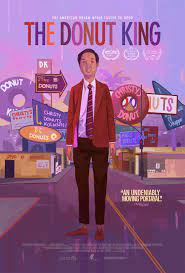
THE DONUT KING
US, 2020, 90 minutes, Colour.
Directed by Alice Gu.
A documentary about the American dream – but which, through a variety of episodes and moods, shows us the dream and the wonders of fulfilment, there is the ever-present danger of the dream turning to nightmare.
Film reviewers sometimes have to offer a caution, that they are personally involved in the narrative, or in the issues. In this case, the present reviewer has to confess to never having liked donuts! And, to say the least, here are 90 minutes of hundreds and hundreds of donuts, of all varieties – and more! So, these words from the rather detached point of view, at least from the perspective towards the donuts themselves.
We are in no doubt from the first 10 minutes of this documentary about the place of donuts in the American menu, sugar, icings and sweetness, and for the American psyche. Dunkin’ Donuts, Winchells, all kinds of donut shops and takeaway. But, there is the fascinating piece of information that it is Cambodian refugees since the 1970s who own and staff so many of these donut stores.
And, from icing exuberance suddenly to the history of Cambodia in the first half of the 1970s, the Vietnam war, its extension into Cambodia, Nixon and the extensive bombings, stopped by Congress, the rise of the Khmer Rouge, the massacre of populations, the enormous migration out of Cambodia, the status of the country by 1976 and the devastation of Phnom Penh. All presented powerfully and with a great deal of contemporary news footage.
So, this is not just a sweetness and tasty documentary.
We are introduced to a significant refugee and his family, wife and many children, extended family. He is uncle Ted, Ted Ngoy, who served in the Cambodian military in Bangkok, who is offered a flight by an American colleague, for refugee status in the United States. Throughout the film, uncle Ted, 77 at the time of filming, is interviewed, giving the background as to what happened, his extraordinary success with donuts, training, franchises, involving his whole family, and his ability to be a sponsor for so many Cambodians taking refuge in the United States, extending their work in providing donuts and being increasingly creative with recipes, cooking styles, decoration. The Cambodians, like the Vietnamese after the fall of Saigon, are nothing if not industrious (which might not give true acknowledgement to their seven-day a week, no holiday, commitment to their work and to the saving of money for the benefits of their family).
One of the commentators is a food and recipes’ journalist, a young man, who is able to comment on this phenomenon of Cambodians and donuts, especially in California. There are also interviews with the executives of Dunkin’ Donuts, Winchells, and other franchises. Which turns the documentary into something of a story of American enterprise within the American dream, the making of money, the investing of money, financial success. And other members from the Cambodian community are also interviewed. And, prominent among the interviewees is Uncle Ted’s wife, Christy, quite a vivacious personality, reminiscing about fleeing Cambodia, the flight, the camp, and her horror at being fed mashed potato and pasta!
One of the key features of the documentary as it looked backs at the 1970s is the contribution of President Gerald Ford and his welcoming the refugees, despite the apprehensions of California Governor Jerry Brown about jobs and workers, the quick establishing of Camp Pendleton and facilities for the refugees, Betty Ford going to the camp and addressing and welcoming them. (The implication, sometimes explicit, is that Americans in those times, despite fears and some xenophobia, were actually more welcoming than present America is to refugees.) Uncle Ted and his family were sponsored by a Lutheran parish reminding audiences of welfare groups, churches, and welcoming migrants, remembering that the United States was built on migrants.
One of the shocks of the film – and, therefore, not to be in included as a spoiler here – is that everything did not go smoothly for some of the migrants, especially problems with money, including heavy gambling, destruction of relationships… Which makes the story of The Donut King, a rather complex tale, not simply a fairytale interpretation of the American dream.
Donut fans will be glad to know that there have been extraordinary adaptation since the 1970s, Americans eating billions of donuts per year, an increasing range of designer donuts – and the visuals do not let up until the final credits!
Lamb/ 2021
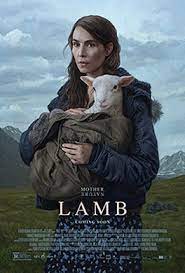
LAMB
Iceland, 2021, 106 minutes, Colour.
Noomi Rapace, Hilmer Snaer Gudnason, Bjorn, Hlynur Haraldsson.
Directed by Valdimar Johansson.
The title, Lamb, sounds innocent enough. Lambs, especially those who do not have to work on farms, seem nice and cuddly. However, there is a Biblical tradition of the sacrificial lamb. And what of the presence of lambs in fairy tales, folklore, in particular countries? Here is an Icelandic variation – not as might be expected.
In fact, the narrative of Lamb is certainly unpredictable. And, audiences will be wondering how to respond as the story unfolds, goes in those unexpected directions.
Probably a word of warning is necessary at the beginning of a review. This is not a film for impatient viewers. They will be turning off very quickly as the film becomes more and more reflective, a film that immerses its audience in the atmosphere of the story, of the settings, of the behaviour of the characters.
This is an Iceland familiar from many of the intriguing films from that country (producing more films than its small population might be expected to make). There are quite a number of films set on farms – and audiences will remember Rams. This is a farm out in the remote countryside, a road in and out, glimpses of cars, and a local bus at the end. However, remote is a key word.
As with so many Icelandic films, out in the countryside, the scenery and the photography of the scenery are quite spectacular, the mountains, the valleys…
There is an ominous opening sequence a herd of horses lost in a snowdrift. And that in great deal of attention to the flocks, in winter, the radio indicating that it is Christmas time, all the sheep in pens inside buildings, crowded together, all turning in the one direction when the farmer comes in, eagerly chewing when hay is strewn along the pathways and they all line up in unison, contentedly chomping. (Perhaps this is where the impatient viewers stop watching!). But we are also introduced to the farmer and his wife, Ingvar and Maria, young middle-aged, bonding together, more silent than talking, working with the sheep. And, as the weather improves, seeing them both out with the tractor, ploughing the ground, planting seeds. (Swedish actress Noomi Rapace spent childhood years in Iceland and speaks the language.)
The only thing which interrupts them is the farmer’s brother, ditched by a group in the countryside, seemingly with money problems, given hospitality by the couple, and working for his keep.
So far, so ordinary. But a highlight of the farmer’s work is the birthing of some lambs. There is a particular lamb that has a difficult birth, and the farmers distance the lamb from its mother. They nurture it, feed it, bringing it into the house, calling it Ada. And Ada is, of course, the lamb of the title.
As mentioned, the plotline is quite unpredictable, first with visual suggestions, then audience surprise at what is happening, the effect of the lamb on Maria, on Ingvar, and the reaction of the brother. And, since spoilers would be inappropriate, this has to be the end of a review with a final comment, tantalising, it is hoped, that what occurs is arresting, sometimes quaint, and, at moments, alarming. As said, this is a film which immerses its audience in life in this Icelandic farm.
- The title, clear, the farm, the sheep, the birth of the lambs, difficulties of birth, the special lamb, Ada?
- The settings, the isolated farm, the sense of remoteness, the road, the episode with the car and the dropping of the brother, Maria driving the car, the local bus? The farmhouse, the barn, the interior pens for the sheep? The exteriors of the buildings? The spectacular scenery, the mountains, the ranges, the valleys? The musical score, the final music from Handel?
- The opening with the horses, the herd, lost in the snow? Suggestive atmosphere? The transition to the barns, the sheep, the interior pens, the focus on the sheep, looking in the same direction, the feeding, moving from pen to pen? The mothers, the births, the tending of the lambs? Then the special birth, the difficulties, Ada?
- Ingvar and Maria, marriage, love, quiet, taking each other for granted? The domestic details? Love and affection? The revelation, later, with Maria visiting the cemetery, dead children? The absence of children and affection for children?
- The details of work, tending the sheep, feeding the sheep? Attending to the births? The spring, the tractor, the fields?
- Ada, the continued care, treated like a child, compensation for the loss of children? The effect on Maria? Eventually on Ingvar?
- The glimpse of the hand, the change of atmosphere of the film, the humanising of Ada, her being treated like a child, growing up, legs, hands, standing up, at the table, seeming to understand? Dressed like a child? In the house, accompanying Ingvar to work, with Maria? The substitute compensatory child? Eat more and more at ease with Ada, taken for granted her presence in the house?
- The brother arriving, his background, dumped, financial problems? The couple giving him accommodation? His immediate reaction about Ada? Disbelief, comment, his being told to acquiesce? His work out in the fields, on the tractor, the tractor breaking down? With Ada, reconciled to Ada? His advance on Maria, her response, locking him in the room, waking him, packing his bag, driving him to the bus, giving him the money?
- Expectations for a happy life with Ada, the prospects of a happy farm, farm work?
- Ingvar going out with Ada, to fix the tractor? The arrival of the Ram, animal, human characteristics, colour, sinister? The shooting of Ingvar? The Ram with the rifle? The taking of Ada? Maria, returning home, hearing the shots, rushing to the scene, cradling Ingvar, his death? The Ram Ada?
- The film stopping rather than ending, the close-up on Maria’s face, the close-up on the audience’s reaction, on what they have seen, experienced, and the final violence? And prospects for the future?
Eyes of Orson Welles, The
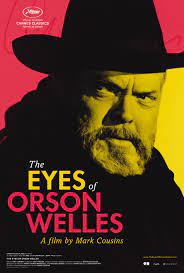
THE EYES OF ORSON WELLES
UK, 2018, 115 minutes, Colour.
Mark Cousins, Jack Kleff (voice of Orson Welles).
Directed by Mark Cousins.
Northern Ireland cinema researcher and historian, Mark Cousins, has built up a substantial body of documentary work on cinema. He now turns his attention to Orson Welles, using a very personalised approach to the life and work of the celebrated actor, director.
The first thing to note is the conversation style of the narration. It is Mark Cousins, rather softly spoken, with his distinctive accent, addressing himself to Orson Welles throughout the film, asking him questions, making observations, suggesting ideas and approaches to him.
The second thing to note is the emphasis on Orson Welles as an artist, his early training as an artist, his incessant sketches, especially in preparation for his films, design, framing… But also his delight in sketching people and places throughout his travels and career.
The film does serve also as a biography of Welles, not straightforward, although it does begin with his childhood, his parents, his travels, his training as an artist, his work in New York City around the age of 20, in radio, in theatre, and eventually moving into film. Cousins also uses the device of looking at various sequences and clips to illustrate his points, scenes which dramatise so many aspects of Welles’ life. He can be compared to Charles Foster Kane. There are many sequences, illustrating his relationship with the Rita Haworth, from The Lady from Shanghai.
The film does trace his marriages and relationships, with a great deal of commentary and presence from his daughter, Beatrice and his archives. But there is also his love for travel, for people, and seeing him both from aspects of Knight and Jester.
We see you Welles’ great love for Shakespeare, his interpretation of Macbeth, his dark presentation of Othello, his familiarity with the inn, The Boar’s Head, the rousing Falstaff, and the pathos of his rejection by Prince Hal and Chimes of Midnight. There are also glimpses of a short film, not completed, about Don Quixote. And Cousins has an admiration for Mr Arkardin and for A Touch of Evil. There is not so much attention to his later work.
Rather, Cousins relies, most interestingly, on clips from interviews that Welles did, especially during the 1960s, his whimsical tone, his serious themes, his philosophical reflections, his political stances.
And, all the time, there is the emphasis on Welles’ eyes, what he saw, what he sketched, how he interpreted what he sketched.
(Some critics are very negative towards Cousins’ device of the interview and dialogue, dismissing it as pretentious and focusing on Cousins himself; and, possibly, Americans, highly critical of an Irish accent commenting on their American actor dismiss his tone and his range of questions and observations. Those who appreciate the style and Cousins’ personalised voice and treatment, will find this documentary highly illuminating.)
Ms White Light
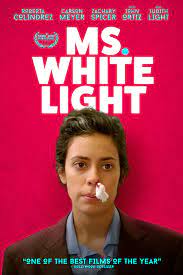
MS WHITE LIGHT
US, 2019, 97 minutes, Colour.
Roberta Colindrez, Zachary Spicer, John Ortiz, Judith Light, Carson Meyer.
Directed by Paul Shoulberg.
White light? Light at the end of the tunnel? Death experiences? The answer is, yes, but not in the way we might have expected.
This drama introduces us to a care industry (perhaps that sounds like an oxymoron). It seems a particularly American thing – it would be interesting to know whether other countries employ members of a company to be present for the dying of a family member, the members of the family unwilling or unable to accompany the dying person. We are left in no doubt with the opening of the film, Lex Cordova (a striking and sometimes bewildering Roberta Colindrez) sitting by the bedside of an dying elderly lady. The family sit by, sad. Then Lex vehemently criticises the members of the family for their lack of care and empathy – and she is punched out for her trouble. Where is this going?
Lex Cordova is certainly an interesting character to watch. At times, she seems to be on the spectrum, so objective and detached she seems in her manner, way of blunt speaking. We guess that there has been a trauma in her life – which comes to the surface towards the end of the film. Lex works with her father, John Ortiz, in an office which has a spare desk and the father wonders whether they should have a secretary. Father and daughter dress in the same kind of suit. They have their takeaway meals watching television. Clients are somewhat scarce.
Lex is challenged by having to accompany a 17-year-old dying from a blood disorder, Nora (Carson Meyer). With her great faith in samurai traditions and weapons, Nora matches Lex’s bluntness with bluntness. Nora will appear again, taking over the management of the office, continually challenging Lex.
However, the core of the film is Lex attending an elderly woman, Val, who has led rather a wildlife, never bound down, drugs, a free spirit, played with intensity by Judith Light, the audience really believing that they are seeing this dying woman rather than an actress. Val is a great challenge to Lex who has some moments of bewilderment. And this is complicated when she encounters Spencer (Zachary Spicer) who also attends the dying, claiming to be some kind of a medium putting the dying person in touch with characters from the past. Actually Val employs quite a number of assistants to her dying, even some of the staff who play cards with her. So, serious moments, comic moments. And situations becoming more and more complicated with Spencer.
It is healthy to see a film dealing with some of the realities of death, hospitals, professional staff, the reactions/superficial reactions of family, challenges to family and their care and lack of care. And, the experiences of death, the loneliness, and the effect of the presence of someone close.
Lex is such a complicated character, bewildering the audience at times, but drawing us deeper into her own responses, her own life and questions, the realities of being alive, and the realities of dying.
(The writer-director of this film, Paul Shoulberg, made the very interesting, little seen, The Good Catholic, a blend of comedy and drama about life in the rectory, three priests and their ministry as well is personal crises.)
- The title? Expectations? Death?
- The settings, hospitals, death beds, the office, hospital canteen, interiors? The musical score? Songs and lyrics throughout?
- The introduction, Lex, at the death bed, of the family watching, her words, the cards? The death, her change of attitude, bluntness, telling of the family, punching her?
- Her father and setting up the company, her talent being present with people dying? Not always evident? The office, the desk, issue of the secretary? The bond between father and daughter, similar suits, travelling together, the car, his care for her? The absent mother – and the explanations later in the film and the effect on Lex?
- The further death beds and her manner? Going to Norah? Nora at 17, the cancer, her theories about Japan, traditions, swords, martial arts, codes of behaviour? Interactions with Lex? Challenging Lex?
- The credibility of the company, being hired to be present to deaths, families and friends unable to cope, avoiding the issues? Lex and her collecting the files, studying them, preparing her cards for responses? Yet her sense of presence, both reassuring and challenging?
- Val, her age, single, active life, drugs, the cancer? The variety of people coming in, the staff playing cards, Spencer is a medium? Lex, reluctant, the conversations, Val and her manner, humour, continually challenging, the pizza, the discussions, Lex beginning and affection for Val?
- The encounter with Spencer, her staring, his response, her abruptness? Learning of what he did? Seeing him in action? The further encounters, the clashes? His inviting her out, conversation, urging her to visit Val, the pizza in his lap, the kiss and its effect?
- Norah, her recovery, appearing at the firm, wanting to help, tidying the office, coffee and bagels? Acting a secretary, joining the family? Her motivations, her codes? Prompting Lex, discussions with her? Lex and irritation, yet listening? Norah hospital, her death? The aftermath of the funeral?
- Val, her death? The effect? Reminders of her mother, with her father, the discussions, the office without Norah?
- The discussion with the couple, Lex trying to explain, Spencer present, his intervening, the explanations… And the future?
Invictus
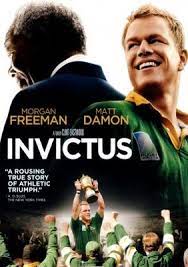
INVICTUS
US, 2009, 134 minutes, Colour.
Morgan Freeman, Matt Damon, Tony Kgoroge, Adjoa Andoh, Patrick Lyster, Penny Downie.
Directed by Clint Eastwood.
Invictus means 'unconquered'. However, the film's title comes from a poem of 1975 by William Ernest Henley, a poem Nelson Mandela relied on during his 27 years internment on Robben Island, especially its final lines, 'master of my fate, captain of my soul'. Mandela was certainly invictus in his surviving prison and invictus in his election as president
of South Africa.
This is a Clint Eastwood film. Eastwood will be 80 in May. During his 70s he has made a string of fine films, Mystic River, Million Dollar Baby, Flags of Our Fathers, Letters from Iwo Jima, Changeling and Gran Torino, an extraordinary effort and one marked by themes of forgiveness, a seemingly far cry from his Dirty Harry days. Eastwood is a master storyteller and, in his older age, has not shied away from significant themes.
As Invictus opens, Mandela is being released from prison in 1990. Eastwood uses television-reporting style of filming not only to indicate the historic moment being recorded but to enable the audience to accept Morgan Freeman as Nelson Mandela for the rest of the film. While he looks like Morgan jman and he sounds like Morgan Freeman and has Morgan Freeman's gravitas, we readily accept that it is Nelson Mandela, the historical person, that we are watching.
In retrospect, as journalist John Carlin does in his book, Playing the Enemy, on which the film is based, it seems a master stroke of politics and humanity (as Mandela notes several times) to bring black and white people together supporting the national rugby union team when South Africa is hosting the rugby world cup in 1995. The sequences where the meeting of football supporters vote to eliminate the colours and the name of the Springboks and Mandela himself comes to tell them not to because it is depriving the Afrikaaners of something they value (which they had done to the blacks) but to use that for uniting people indicates his shrewdness and vision. The sequence where he persuades his black security officer to accept former white police, from Special Branch, into the bodyguard squad is similarly powerful.
The portrait of Mandela is glowing though the rift with his wife and family, his indefatigably driven work ethic, are indicated.
Matt Damon plays Francois Pinaar, the captain of the Springboks, who, with example in leadership and the encouragement of the president, urges his team on to a surprising victory. Again, the suggestion of Mandela that the team go to the townships and coach the black youth despite the wariness and ignorance of the conditions on the part of some of the team, works wonders and, on television, is a coup for public relations.
The final match against New Zealand's All Blacks is presented in all its rough and tumble ('soccer is a gentlemen's game played by hooligans and Rugby is a hooligans game played by gentlemen') though whether it would convert any American audience to the code is probably a 'no'.
With Mandela and with the Truth and Reconciliation Commission, 1990s South Africa, despite economic and social difficulties, despite the high crime rate, showed the world that hatred and revenge were understandable but futile – that is the spirit of Invictus. The poem reveals the experience of Mandela on Robben Island.
Invictus
Out of the night that covers me,
Black as the Pit from pole to pole,
I thanks whatever gods may be
For my unconquerable soul.
In the fell clutch of circumstances
I have not winced or cried aloud.
Under the bludgeonings of chance
My head is bloody but unbowed.
Beyond this place of wrath and tears
Looms but the Horror of the shade,
And yet the menace of the years
Finds and shall find me unafraid.
It matters not how strait the gate,
How charged with punishments the scroll,
I am the master of my fate:
I am the captain of my soul.
- The title? Unconquered? The Henley poem of 1875, I Am the Master of My Fate, the Captain of My Soul?
- The status of Nelson Mandela, as a person, as a politician, as a humanitarian?
- South African history, the decades of apartheid, the attitudes of racism, the oppression by the Afrikaners, the reaction of black Africans? The end of apartheid? The transition to the Republic of South Africa under democratic rule?
- Clint Eastwood as a storyteller, his age when making this film, a humanitarian?
- The visuals of South Africa, Capetown, Johannesburg, the townships? In the 1990s? Pretoria and government? The look of the townships and the roads? The children playing? The visuals of Capetown, the city itself, the stadium, the surrounding mountains? The trip to Robben Island?
- The musical score, the anthems, the songs and the spirit?
- The 1995 World Rugby Cup, for the rugby nations, for the world, for South Africa?
- The introduction to Mandela, his release from prison, as a person, his dignity, the interviews? The people’s reaction? The use of the news footage style, audiences being able to believe that Morgan Freeman was Mandela?
- Mandela as president, democratically elected? The range of reactions? Black and white? The motorcade, the two groups playing football, the white school and the fence, the black boys? The different responses? The whites and their condemnation, their fears? The Pienaar family, the father’s reaction to Mandela?
- Mandela as president, in his home, the early morning walk, the guards, the fears of assassination, the paper deliveries and the truck? Going to the office, seeing people packing, the staff and their fears, Brenda and her command of the staff, adviser to him? Assembling the staff, his speech, welcoming them to stay if they wished? The head of security, the document indicating that former white police would be part of the bodyguard? His appeal? Mandela’s explanation? For unity, for the needs of the Afrikaners to accept him? The difficulties of the Afrikaners controlling the police, the economy, the money?
- Mandela as indefatigable? The international tours and his speeches? The theme of forgiveness and his continued preaching of it, to Jason and the security guards? The importance of this in relationship to his wife, family?
- The scenes at home, the servants, at the office, his work?
- The theme of football, the introduction to Francois’ family, the Springboks playing, playing badly, the TV commentator and his devastating criticisms? The black African meeting, wanting to abolish the name Springbok, to substitute Proteas? Changing the colours and the football jerseys? Communicating the decision of the meeting to Mandela, the vote at the meeting, Brenda warning him in the car about sensibilities? His making the speech, making the decision? The background of the black Africans supporting England or any opposition to the Springboks? His own experience of stances at Robben Island? The scene of the Springboks playing England, the black support for England?
- The World Cup, the idea of South Africa’s victory because of their being hosts? The possibility for unification of the people? The role of sport? National sentiment?
- The invitation to Francois to come to meet him, the family’s reaction? Francois and his nervousness, the discussions with Mandela, the discussion about example, inspiration, the introduction of the poem Invictus, the Springboks and their singing and morale?
- The training sequences, hard training, making sure the team was fit? The decision that they should go and coach children in the townships, the bus ride, the fears, the shock of some of the men at seeing the townships and the way of life, the boys playing football, the training, the bonds between the team and the kids, Chester as the black representative? The hero? The background of the boy going to the charity and refusing to wear the Springbok jersey? Mandela at work, the television showing the team and the coaching, everybody watching, Mandela valuing the image more than anything?
- Mandela’s physical collapse, working while watching television, Brenda and the staff trying to control him?
- The plan for the World Cup, his getting information, studying it?
- Audience response to Rugby Union, a hooligan’s game played by gentlemen, contrasting with soccer as a gentlemen’s game played by hooligans? The importance for security at all of the matches? The explanations?
- The security guard personnel, Jason and his command, his resentment at the police being introduced? Mandela instructing him? His following orders? The growing bonds between the whites and the blacks, soccer and Rugby Union, the explanations? The security guard asking about Mandela’s family? Mandela’s daughter and her hostility, the bangle, the memories of her mother? Later and their supporting him at the time of the World Cup?
- Mandela at ease with everyone, with officials, with the cheering crowds? Popular at all times?
- The World Cup, the variety of matches, Francois as leader? His character, his place in the family, with the black maid and getting her the ticket, with his girlfriend? His discussions with Mandela, Mandela meeting the team, learning their names, shaking their hands? His own personality with the team, the drinking of the beer as the last toast to defeat? His encouragement on the field?
- The grand final, the tickets, Francois’ family, the security, the South African Airways plane flying over, the nervousness, the pilot taking responsibility? Mandela and his going on the field, the names of the players? The anthem? The range of different people watching, at home, at bars, the television?
- The detail of the game, tough, the scores, the All Blacks? The New Zealand prime minister? The reactions, the boy outside and his getting closer to the security guards to listen? The All Blacks and Jonah Lumu? Being targeted?
- Success, the two men on the dais, the World Cup? A united South Africa?
- The actual possibilities for unification, the difficult circumstances, the background of truth and reconciliation, the exercise of leadership? The final photos during the credits of the actual characters?
Did you know the MSC own a Christian School in Rome?
Did you know the MSC own a Christian School in Rome?

The photo has Tim Brennan with Secretary General, Mike Miller, and assistant, Richard Suresh – the gentleman in the shirt is the Principal of the school, Eric Mayer.
Tim writes: Presently about 200 students and 50 boarders-some housed offsite.

Students are from around the world -a good number from the USA. With FAO around the corner it is a popular school for the families of their employees.
The curriculum includes a large number of languages including Greek and Latin. As well they are into a range of modern STEM subjects. They were the only Italian School to enter a student model car in the Formula One for School Students in the UAE.

The school is St Stephens. Those with long memories will know that it is the former international scholasticate at Via Aventina 3, next to the FAO building. It was the scholasticate from the end of World War II until 1972. The MSC lease it to St Stephen’s.
Established by the Rev. John O. Patterson, former Headmaster of the Kent School in Connecticut, to epitomize the best elements of a classical liberal arts education, St. Stephen's opened for classes in 1964 and the first seniors graduated in 1966.

The neighbourhood, the Circo Massimo and the Palatine hil and ruins
Its founder chose Rome as the site because he believed the city to be "the symbol and repository of the enduring ethical, cultural and religious values of the West", as well as "one of the most cosmopolitan international crossroads of the modern world. "
Memories: Barry Brundell, John Bosman, Peter Malone and former superior general, Michael Curran, were ordained in the chapel and celebrated their first Masses there, 1965 and 1966.

Waiting for Anya
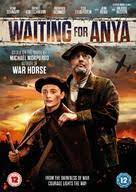
WAITING FOR ANYA
UK, 2020, 104 minutes, Colour.
Noah Schnapp, Thomas Kretschmann, Frederick Schmidt, Tomas Lemarquis, Gilles Marini, Elsa Zylberstein, Angelica Huston, Jean Reno, Sadie Frost, Declan Cole.
Directed by Ben Cookson.
Anya is a young Jewish girl, seen with her father at a Paris railway station, the invading German supervising, the rounding up of the Jews and putting them in the rail transports for the concentration camps. Her father pushes Anya under the train carriage, is able to get a sympathetic passenger to take her into a local train to safety. Her father lives in hope that he will see her again.
Over the 70 years since these events took place, there have been many films about France, the German occupation, the Vichy government, the rounding up of the Jews and their being transported to the camps. Here is another similar story, a reminder that these events should not be forgotten.
Many of the film is about France during World War II are grim, stark and violent, stories of harsh treatment of the Jews, oppression in occupation, the Resistance, the many French people in towns and villages who sheltered the Jews or who organised their crossing from France into Switzerland over the Alps or crossing from France into Spain over the Pyrenees. This is a Pyrenees story.
This film is, we might say, more PG-rated. It is geared towards a younger audience, a film for teenagers, for instance, to learn about these events. It is also a film that many audiences who say they do not want to see too much violence on the screen, can watch, discomfited and saddened with the story and the characters, but not upset by visual violence.
After the prologue in Paris, all the action takes place in the Pyrenees village, village characters, a focus on a young boy, Jo, who looks after the sheep as well as going to school, at home with his mother because his father is in a prisoner of war camp, and the patriarchal grandfather. There is an episode where Jo encounters a huge, menacing bear and alerts the townspeople who kill it. But Benjamin, a stranger who is in hiding with the local widow, caring for children and getting them across the Pyrenees, befriends Jo who then works for some years as the delivery boy for the widow, bringing food and necessities from the village for the children (who eventually have to hide in the cave).
The Germans arrive, occupy the town as we have seen in so many films. The officer in charge rather younger, looks sinister, bald, glasses – and, initially, executing three hostages (offscreen). However, there is The Corporal, an older officer, more benign, who befriends Jo and his friend, Hubert, who is mentally impaired. The Corporal takes them to the mountains to watch the Eagles.
The high drama of the film is the plan to get the children across the border, the device of having the spring celebration of the sheep, herding the sheep to the mountaintop, the children going with them. And everyone at a concert, the Germans included, so the children can come down from the cave to be ready to go with the sheep. This has the participation of the local parish priest, a genial presence and helper.
Ultimately, the Germans have to leave, there are some moments of tragedy but peace comes again to the Pyrenees.
The film has a strong cast including Jean Reno is the grandfather, Angelica Huston is the widow, Noah Schnap (Stranger Things) is Jo and Thomas Kretschmann is The Corporal. The director is Swiss, Ben Cookson.
Audiences who want strong dramas of occupied France may find this too mild. But, Waiting for Anya can be a film which introduces younger audiences to these historical events, war, occupation, persecution of the Jews, suffering.
- A World War II film? The rounding up of the Jews? Life in the Pyrenees, taking the children across the mountains to Spain?
- Audience response to these World War II stories? This film geared for a broader audience, not giving so much graphic detail of persecution and violence, presenting some more humane characters despite the occupation, the focus on children, the dangers in crossing the Pyrenees, the commitment of local people to help the Jewish children? The film to dramatise these events for younger audiences, for those whose sensitivities dislike depictions of violence?
- The prologue, France, the German invasion, the rounding up of the Jews, the trains, the crowds, the father and daughter, hiding under the train, the father getting his daughter into the local train? The title – and the many years passing, waiting for Anya to arrive in the Pyrenees?
- The transition to the south of France, rural life, the characters in the town, the shepherds, the mountains, peaceful rural settings?
- The family, the grandfather and his experience in World War I, patriarchal, his son a prisoner of war, his wife at home, Jo, his age, work, out with the sheep? Hubert, age, mental impairment, sense of fun, involvement? The ordinary routines of life in the town?
- The arrival of the Germans, taking over the town? Weissman, in charge, his appearance, age, bald head, sinister look? The other soldiers? The presence of the Corporal, his age, experience, more benign? The harsher aspects of their presence, assembling the people in the square, the three hostages to be executed? The less harsh aspects, mingling with the people, especially The Corporal? The link of the Resistance and blowing up the Leah layer, Benjamin and his love for Leah?
- The danger, the threat to the Germans, the response by collecting the food and taking it away?
- Life at home, time passing, Jo and his work for the widow, his grandfather getting together with the widow, Jo’s mother, maintaining the house, the return of her husband from the war, going to the bar, his drinking, anti-German, attacking Jo for being friendly with The Corporal?
- Jo, Hubert and The Corporal going to the mountains, seeing the Eagle?
- The decision to take the children over the mountain, getting the help of the priest, the priest and his genial role in the town, down-to-earth? The explanation of the spring celebration, taking the sheep to the mountains, everybody participating, and the cover of the concert in the church? The choir, the schoolmistress, Jo at school, the buildup to the concert? The invitation to all the Germans to come, the delay, their arriving late? The concert and their enjoying it? Jo anxious?
- The children transferred from the cave, down to the town, the preparation to go to the mountains, the taking of the sheep, the procession up the mountain, the crowds and the children? Hiding the children in the hut at the top of the mountain? Leah, upset, Benjamin having to take her back to the house?
- The Corporal, the Germans, going to the top of the mountain, the Corporal knowing what was happening, the discussion with Jo and his father, commenting on the window case flapping? The achievement of getting the children across? Benjamin and his being taken? Waiting for Anya?
- The end of the war, the Germans and their leaving? Hubert, the rifle, following the Germans – and his being shot?
- A year later, life resuming normal? Anya’s arrival?
